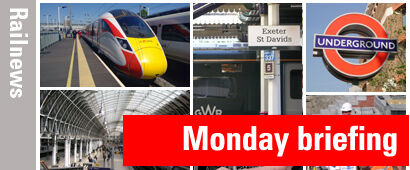Train operators are advising passengers not to try to travel today on some routes, because Storm Franklin has brought more rain and high winds to most of Britain. It is the third storm within a few days, and there are concerns that the previous bad weather has weakened trees and left the ground saturated. Flooding has closed several lines in Yorkshire and Rotherham Central station is swamped, in spite of flood alleviation measures. Also affected are Doncaster, Kirkstall, Mirfield and parts of the Calder Valley line between Leeds and Manchester. Network Rail spent the weekend monitoring water levels and attempting to clear water from the tracks, but its efforts were hampered by more heavy rain. Timetables have been reduced in many areas.
Another brief breathing space for Transport for London
Government funding for Transport for London will now continue after a weekend of talks, but only until the end of this week. The move follows a warning that without funding TfL might have to effectively declare itself bankrupt. The Mayor of London Sadiq Khan said: 'This extension to the current funding deal until Friday 25 February will allow negotiations to continue. The pandemic is the only reason TfL is facing a financial crisis. I urge the Government to engage with TfL and City Hall in good faith so that we can finally agree a fair, long-term funding deal that will protect London’s transport network – for the sake of the capital and the whole country.' Labour London Assembly member Elly Baker said the extension was another 'last minute knock back', adding that 'kicking the can down the road benefits no one'.
RAIB publishes interim report into Salisbury collision
An interim report into the collision between two trains at a junction near Salisbury station on 31 October has been published by the Rail Accident Investigation Branch. It says rails in the area had been contaminated by leaves which had been crushed by train wheels, and that it was likely that the rails were wet as well. The RAIB has also revealed that a railhead treatment train which should have passed the crash site almost two hours before the collision had been delayed by engineering work and would only have treated the area later in the evening.


